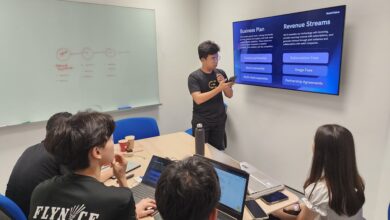Fostering innovation and entrepreneurship in education

Education is essential for fostering innovation and entrepreneurship among students in a rapidly changing world. To equip learners with the skills and attitudes necessary to tackle complex problems and promote economic and social development, the method of imparting knowledge must be advanced. According to a professor at the Massachusetts Institute of Technology (MIT), facilitating self-starters and forward-thinkers requires creating an environment where students can generate new ideas without fear of making mistakes.
Another important strategy, according to her, is introducing experiential learning into schools to promote innovation and entrepreneurship. This is mainly characterised by practical applications that students can use to improve their learning, building on their theoretical foundation. Internships, for example, are designed to provide practical training, allowing students to work on projects across various sectors and complete tasks under the supervision of lecturers. This exposure helps students come across real-world problems faced by contemporary entrepreneurs, equipping them with critical soft skills such as problem-solving, teamwork, and communication to solve these problems at their end.
Another important aspect of this approach is the inclusion of smart classrooms equipped with digital tools and software that can transform traditional teaching methods, making them more interactive and engaging when properly utilised. Advances such as virtual reality, artificial intelligence, and online collaboration tools enable innovative teaching practices, allowing students to access a wealth of resources and information. When educators leverage technology to foster a culture of innovation and entrepreneurship that reflects the current digital business environment, it becomes possible to cultivate growth mindset among students. A growth mindset is the belief that talents and intelligence are developed through hard work. Teachers can instill this attitude by creating supportive learning environment where failure is seen as an opportunity for learning. By experimenting with new ideas, students are encouraged to take risks and persevere through challenges, ultimately becoming successful entrepreneurs and innovators.
In an effective learning environment, essential elements and networks go hand in hand. Teachers can foster the discovery of positive aspects in various perspectives by promoting interactions among students. As a result, students can gain a comprehensive understanding of their lessons both in and out of the classroom by engaging with peers who possess diverse knowledge.
Humans also need the ability to adapt and perceive situations in different ways. This means that an individual’s focus can shift depending on current circumstances, especially in our fast-paced world. To facilitate this, educators must integrate design thinking and agile techniques into their instructional resources. The key is consistency with repetitive actions: throughout a learning process, it may be necessary to break down tasks into smaller parts and follow up separately on the completion of each action. This method ensures that students can effectively grasp and apply new concepts, preparing them to navigate and succeed in a rapidly changing world.
Another powerful tool to encourage innovation and entrepreneurship is mentorship, where students are linked to experienced mentors who provide guidance and support. These mentors can help students develop their ideas, start their own companies, and navigate the challenges associated with launching or expanding a business. Mentorship programs in colleges, connecting learners with successful businesspeople, administrators, or stakeholders beyond their teachers, serve as a valuable support outside the classroom.
Supporting young businesses also involves making funding and resources accessible. Educational intuitions at primary, secondary and tertiary level should build innovation labs, incubators, and accelerators on campus to help students develop and implement their ideas. These facilities can offer start-up funds, office space, technical support, and connections with established people and businesses in the relevant fields. By providing these resources, educational institutions can simplify the process of starting a company and increase the likelihood of success.
Authors of school syllabuses must recognise that an inventive approach is key to future success for learners. Organising training programs focused on setting up new companies, conducting innovative businesses, and entrepreneurial activities in general is a good idea. Integrating disciplines like enterprise management, innovation management, and business development with a degree in entrepreneurship offers students the chance to apply what they learn both theoretically and practically. These modules might include marketing studies, budgeting and savings plans, as well as trademarks and patents. Teachers provide students with the necessary resources to turn their ideas into viable ventures.
Leadership education is another critical aspect of entrepreneurship education. Effective organisations need good role models, which require innovation. Therefore, educational programs should blend topics to focus not only on knowledge but also on leadership skills, including visioning, strategic thinking, emotional intelligence, and ethical discernment. To become effective leaders, educators help students inspire others, encourage teamwork, and manage successful teams in the complexities of business. There is also need to talk about gender inequality, differences in the socioeconomic status across different sections of society, and also the fact that there are no role models to emulate within.
Tharenou and Coulson-Thomas (2007) assert that utilising social capital can enable female entrepreneurs to access unique sources of information and networks, thereby enhancing innovation and growth. Addressing gender inequality, socioeconomic disparities, and the lack of role models is crucial.
Similarly, involvement in entrepreneurial endeavours cannot be confined to an enclave, accessible only to individuals from wealthy backgrounds. Educators advocating for diversity and inclusion can help develop a vibrant learning atmosphere enriched by diverse mindsets and talents. Effective teaching requires agility and business skills that span various learning objectives, including applying theory, leveraging technology, fostering professional mindset shifts, and encouraging collaboration and adaptability. Educators must also advise and usher in comprehensive curriculum coverage, cultivate leadership abilities, and keep pace with available resources while setting an example for others.
Acting globally involves engaging varied groups and establishing partnerships between public and private entities. Recruiting alumni from universities worldwide to enhance teaching staff, creating diverse assessment methods, and integrating disciplines with career-oriented, ethical business teachings are essential. By addressing these concerns, educational institutions can create an environment that robustly supports learners, fostering quick thinkers with multiple solutions and nurturing a new generation of young and strong leaders.



